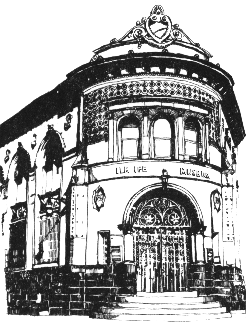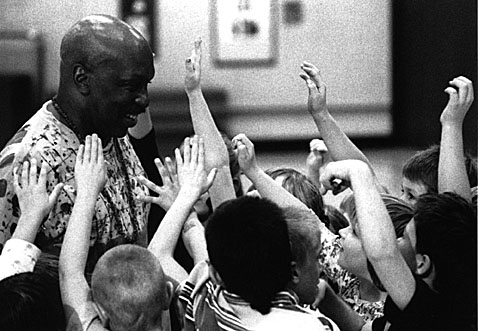
Arthur L. Hall, internationally known dancer, choreographer, and teacher, died of cancer July 6, 2000, in Camden, Maine. He was 66. Born April 18, 1934, in Memphis, Tennessee, the son of Ms. Sally Yancey and Joshua Milton, he was reared by his mother and grandmother Ms. Emma Yancey on Beale Street and later in Washington, DC, where Ms. Sally remarried to Patrick Hall, giving Arthur the new family name.
Arthurís stage debut was at age 16 in the chorus of the National Negro Opera Companyís production of Robert Nathaniel Dett's The Ordering of Moses at Griffith Stadium, Washington, DC, July 28, 1950. The next year he moved to Philadelphia, studying dance with Marion Cuyjet, Joe Nash, and John Hines, among several other dance masters. Beginning in 1953, along with drummer Bobby Crowder, his long-time dance partner Ione Nash, George Williams and others, he was a principal dancer in the hugely influential West African Cultural Society founded in Philadelphia by the Ghanaian artist, Olympic athlete, and cultural minister F. Saka Acquaye. It was this pioneering work, along with that of anthropologist Pearl Primus and Broadway star Katherine Dunham, which was seminal to the reintroduction of West African art and aesthetics to American popular culture for the first time since the tortured days of slavery.
 From 1955 to 1958, Arthur served in the US Army, Special Services, stationed in Germany, where he became an expert photographer. Upon his return to Philadelphia, he opened a photography studio. Also in 1958, as director of the Sidney King Dance Theater, he first presented African Sketches, based largely on what he had learned from Saka Acquaye. This company evolved into the Arthur Hall Afro-American Dance Ensemble, originally based in his motherís apartment, which in one form or another would continue to perform for the next thirty years, through triumph and tribulation, until Arthur finally left Philadelphia at the end of 1988.
From 1955 to 1958, Arthur served in the US Army, Special Services, stationed in Germany, where he became an expert photographer. Upon his return to Philadelphia, he opened a photography studio. Also in 1958, as director of the Sidney King Dance Theater, he first presented African Sketches, based largely on what he had learned from Saka Acquaye. This company evolved into the Arthur Hall Afro-American Dance Ensemble, originally based in his motherís apartment, which in one form or another would continue to perform for the next thirty years, through triumph and tribulation, until Arthur finally left Philadelphia at the end of 1988.
Arthurís artistic vision combined traditional African dances with modern dance. He studied Dunham technique with Syvilla Fort in New York and Caribbean dance with Lavinia Williams in Haiti. In 1966 his company became associated with the Theatre of the Living Arts under the direction of Andre Gregory (of My Dinner with Andre fame). Arthur choreographed the controversial, ultra-modern play Bechlch (1967), written by Rochel Owen, with music by Teji Ito. Also in 1967, as the "Afro American Ensemble of the Theatre of the Living Arts," Arthur presented MOJUBA! on CBSís Repertoire Workshop, the first television program to be broadcast nationally completely in color.
The tumultuous year 1968 began with Arthur and his company performing for African dignitaries in Washington sponsored by the State Department. On April 4th, when Dr. Martin Luther King, Jr. was assassinated, they were in dress rehearsal with Max Roach and Abbey Lincoln for the Freedom Now Suite. After some debate, the show opened the next day - as the city burned about them. Arthurís dancers were on the front lines of the Action Summer program, performing in parks and city streets through the long, hot summer of 1968. They performed with Count Basie and Dick Gregory and at Club Harlem in Atlantic City and at Jacobís Pillow Dance Festival in Massachusetts. At yearís end they produced another television program, Africaís Children.
 Arthur was the cultural arts director of the Model Cities program in Philadelphia for the life of the program 1968-1974. Working with First Pennsylvania Bank and Philadelphia National Bank, he founded and directed the Ile Ife Black Humanitarian Center on Germantown Avenue in North Philadelphia in 1969. "The first community art center in America to be established by a dance company," Arthur was proud to claim. In 1972 the Ile Ife Center was given an abandoned bank building in which Arthur established the Ile Ife Museum of African Art. Robert Farris Thompson, the art historian at Yale University, says that with the opening of the Ile Ife Museum, the Africanist center of America moved from Katherine Dunhamís school in New York to Ile Ife in Philadelphia.
Arthur was the cultural arts director of the Model Cities program in Philadelphia for the life of the program 1968-1974. Working with First Pennsylvania Bank and Philadelphia National Bank, he founded and directed the Ile Ife Black Humanitarian Center on Germantown Avenue in North Philadelphia in 1969. "The first community art center in America to be established by a dance company," Arthur was proud to claim. In 1972 the Ile Ife Center was given an abandoned bank building in which Arthur established the Ile Ife Museum of African Art. Robert Farris Thompson, the art historian at Yale University, says that with the opening of the Ile Ife Museum, the Africanist center of America moved from Katherine Dunhamís school in New York to Ile Ife in Philadelphia.
In 1973 Arthur directed the full-length ballet Orpheus, with Odean Pope as music director, inspired by the Brazilian film Black Orpheus. He performed his signature dance Obatala with the Philadelphia Orchestra under the direction of Eugene Ormandy. In 1974 he and his company traveled to Ghana and Nigeria under the auspices of the United States Information Agency.
 In 1975 he produced another full-length ballet, A City Called Heaven, with John Blake, Jr. as music director. The next year he restaged the ballet Aida. The year after that he toured the US with his production Fat Tuesday & all that jazz with Milton Batiste directing the Olympia Brass Band and the Preservation Hall Jazz Band of New Orleans. Fat Tuesday was broadcast for several Mardi Gras running on Great Performances: Live from Wolftrap, and it was restaged twenty years later, 1997, by Muntu Dance Theater of Chicago, with Arthur and Milton Batiste again collaborating on the production. On the original Fat Tuesday tour, Arthur received the keys to the City of New Orleans, and he was honored as a returning prodigal son by the City of Memphis.
In 1975 he produced another full-length ballet, A City Called Heaven, with John Blake, Jr. as music director. The next year he restaged the ballet Aida. The year after that he toured the US with his production Fat Tuesday & all that jazz with Milton Batiste directing the Olympia Brass Band and the Preservation Hall Jazz Band of New Orleans. Fat Tuesday was broadcast for several Mardi Gras running on Great Performances: Live from Wolftrap, and it was restaged twenty years later, 1997, by Muntu Dance Theater of Chicago, with Arthur and Milton Batiste again collaborating on the production. On the original Fat Tuesday tour, Arthur received the keys to the City of New Orleans, and he was honored as a returning prodigal son by the City of Memphis.
As captivating a dancer and as unique a choreographer as Arthur was, he is perhaps most widely loved and remembered as a master teacher. He has taught classes for thousands upon thousands of people over the past half century, from the most strenuous technique classes for professional dancers to the gentlest call-and-response classes for kindergartners, Arthur was gifted with an ability to read his students and tailor his classes to individual needs. His therapy classes for the physically or mentally disabled were always joyful, and frequently produced near-miraculous results. He had an active schedule of master classes for teachers across the country.
 Arthur honed his teaching skills beginning with the Young Audiences program of Eastern Pennsylvania. In 1971 he became a panelist and one of a few movement specialists at the inception of the Movement Education program of the National Endowment for the Arts. This program was the NEA's first attempt to integrate dance into the schools, and it started Arthur on a long and busy schedule of school residencies across the country, lasting up to just a few weeks before his death. Once a school system got hold of Arthur, they wouldnít let him go. Year after year he spent Februarys in the Arizona schools, fall and spring in the schools of New Hampshire and Maine.
Arthur honed his teaching skills beginning with the Young Audiences program of Eastern Pennsylvania. In 1971 he became a panelist and one of a few movement specialists at the inception of the Movement Education program of the National Endowment for the Arts. This program was the NEA's first attempt to integrate dance into the schools, and it started Arthur on a long and busy schedule of school residencies across the country, lasting up to just a few weeks before his death. Once a school system got hold of Arthur, they wouldnít let him go. Year after year he spent Februarys in the Arizona schools, fall and spring in the schools of New Hampshire and Maine.
He was particularly fond of Maine, first arriving in the schools here in 1977. In 1981 he founded the People-to-People Dance Company in Camden, a dance space that continues to this day. He was also inspirational in the establishment of the Belfast Dance Studio and taught at the Bates Dance Festival. Arthur made Maine his official residence upon the death of his mother in 1995.
In addition to his early teaching at the Sidney King School of Dance, he was for a time director of the dance department at Philadelphia Community College. From 1977 to 1980 he taught dance at Dartmouth College, producing the acclaimed Eulogy for John Coltrane. He taught for the American Dance Festival, which sent him abroad on several occasions, including tours to Ghana, Zaire, Mozambique, and South Korea. In 1991 he received the Mayor's Award of Portsmouth, New Hampshire, for their schoolís original production of Ahimsa: non-violence, a modern ballet which drew parallels between the lives of Dr. King and Mohandas Ghandi.
He has received numerous awards from the City of Philadelphia and her institutions and from the Commonwealth of Pennsylvania, most notably perhaps the Pennsylvania Governorís Award for Excellence in the Arts on the same program with James Stewart and Eugene Ormandy. At the awards performance that night, Arthur performed his inimitable Obatala and then introduced his friend and mentor Saka Acquaye, whose troupe Wulomei performed for the Governor and the assembled dignitaries. Most recently, in 1997, he received special recognition for Excellence in Arts Education from the Governor of New Hampshire for more than twenty years of service to the children of that state.

He is survived by three aunts, Gracie Dawson, Katie Wade, and Annie Rose, all of Memphis, an uncle, Thomas Yancey, of Stanton, Tennessee, and numerous cousins. Funeral arrangements are pending. They include the return of his remains to his family in Tennessee, to be reunited with his mother in the Mississippi River. In lieu of flowers, contributions may be sent to:
- The Arthur Hall Education Fund
c/o Nancy Salmon
Maine Arts Commission
25 State House Station
Augusta, Maine 04333.
Bruce Williams
Searsport, Maine
6 July 2000